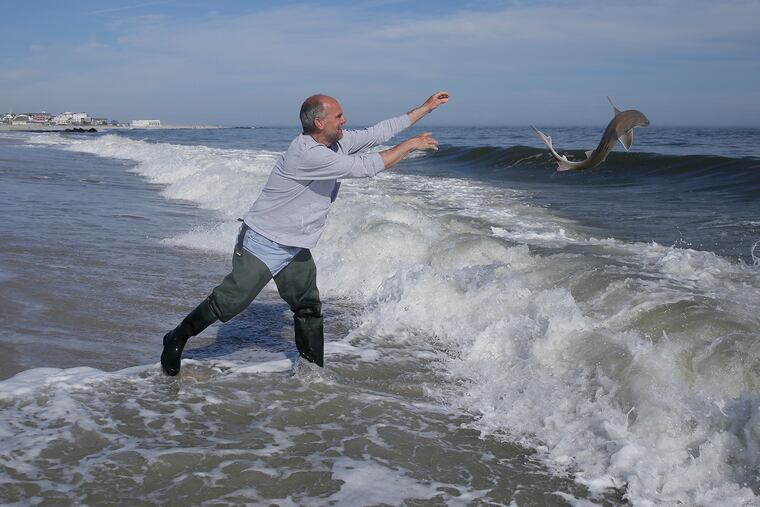Spring, sunshine, and sickness: Coronavirus continues to kill as states move to reopen
On Sunday it seemed possible to believe that the crisis was ending, or at least stabilized, even as some of the world’s biggest countries reported new peaks in infections

The bright bloom of spring brought more sunshine and warmth to the Philadelphia region on Sunday. Along with more bleak reports of sickness. And more death.
The numbers that define the human cost of the coronavirus pandemic continued to rise, even as plans to restart stalled state and local economies crept forward, and shutdown-weary people swarmed newly reopened parks in New Jersey.
Governors in New York, Pennsylvania, New Jersey, and Delaware joined three other northeastern states in a pact to collectively buy $5 billion in personal protective equipment, erecting a barrier against future shortages while saving taxpayers money.
Pennsylvania neared a milestone 50,000 coronavirus cases on Sunday. A line of dogs — and their chastened owners — got chased off a New Jersey beach. The annual bar-to-bar “Clown Crawl,” renamed the “Clown Sprawl” to reflect social-distancing guidelines, drew only a handful of costumed funny men and women.
Everywhere, it seemed, the persistent chirp of songbirds made it almost possible to believe that the crisis was ending, or at least stabilized, even as some of the world’s biggest countries reported new highs in infections.
India, second only to China in population, saw its biggest one-day jump, while new coronavirus cases in Russia topped 10,000 for the first time, and the death toll in Britain neared that of Italy, the epicenter in Europe, ABC News reported.
The United States continues to be the far-and-away world leader: More than 1.1 million Americans were confirmed to have the coronavirus and more than 67,000 have died as of Sunday. By comparison, second-place Spain had 216,000 infections, and Italy had the second-most deaths, at nearly 29,000, according to Johns Hopkins University.
The news was hardly better locally.
In soon-to-slowly-reopen Pennsylvania, an additional 962 people had tested positive, bringing the total to 49,267, officials announced on Sunday. With 26 more deaths, that toll increased to 2,444. Nursing homes account for 67% of those.
In Philadelphia, expected to be among the last parts of the state to restart, the story sadly remained the same. Health Department officials announced 327 additional cases, bringing the total to 15,854, and 22 more fatalities that raised the death count to 727.
More than half the deaths were among residents of long-term care facilities. Nearly a thousand patients are being treated in Philadelphia hospitals.
New Jersey Gov. Phil Murphy reported Sunday that 3,144 more people had tested positive, bringing the state total to 126,744, and 137 more had died, pushing that sum to 7,871. More than 5,300 New Jerseyans are in hospitals, including more than 1,600 in critical or intensive care.
On Sunday, New York Gov. Andrew Cuomo announced the formation of the seven-state consortium to fight the pandemic, to “help us get the equipment and get it at a better price.”
Pennsylvania Gov. Tom Wolf, who attended the announcement virtually, said that states will gain from not needing to compete against one another for supplies, and that the group also should collaborate on expanding testing.
“By working together," Wolf said, “we can do a lot more than we can do with each of us working on our own.”
The governors — including those in Connecticut, Rhode Island, and Massachusetts — hope a regional approach will enable them to stabilize the supply chain while reducing costs. Murphy, who also joined remotely, said the consortium should look to buy American-made equipment, to help local businesses.
Health experts warn of a potential second wave of COVID-19 as lock downs get eased and more people circulate.
Locally, the warm weekend weather and general stay-at-home fatigue combined to draw people outside, causing a number of New Jersey parks to be overrun on Saturday and leading state officials to warn people to go elsewhere on Sunday.
Barnegat Lighthouse State Park, Bulls Island Recreation Area, Delaware & Raritan Canal State Park, Hacklebarney State Park, and the Wharton State Forest were among those crowded with visitors on Saturday.
“REMEMBER, COVID-19 IS NOT GONE,” state Department of Environmental Protection officials said in an all-caps warning on Sunday. “In order to KEEP PARKS OPEN and all visitors a safe distance from one another, visit close to home, mask up, and make your stay short.”
Murphy has warned that he won’t hesitate to re-close parks if a lack of safety precautions threatens to increase the spread of the virus.
New Jersey declared beach access closed at Corson’s Inlet State Park, saying only boaters would be allowed to use the parking area. That followed indications on Saturday night that visitors were using the park as a means to reach the closed beach in Ocean City.
“Quite a few people had used the entrance to go north on to Ocean City’s closed beaches,” one person wrote on the state parks’ Facebook page. “We came back at 2:45 p.m. ... cars everywhere people with no masks or facial coverings, groups all over, no distancing.”
Staff writer Laura McCrystal contributed to this article.